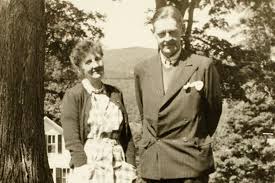Michelle Taylor at The New Yorker:
 Most readers know Eliot as the arch-impersonal poet, who bewildered the world with “The Waste Land” and proclaimed that “poetry is not a turning loose of emotion, but an escape from emotion.” Readers of this Eliot might, at first, have difficulty recognizing the gushy, hyperbolic admirer who signed his letters to Hale as “Tom.” In many of the letters, he described Hale as a kind of divinity, or at least nobility: “my Dove,” “my paragon”; his “one Fixed Point in this world.” Yet Eliot’s grandiloquent devotion can also sound like a kind of escape from certain messy feelings—the turmoil of his marriage, his uncertainty about his career—into something closer to what he sometimes called an “art emotion,” an impersonal, transcendent feeling. In his famous 1919 essay, “Tradition and the Individual Talent,” Eliot wrote, “The progress of an artist is a continual self-sacrifice, a continual extinction of personality.” In 1936, when Hale had at last returned his affection, Eliot marvelled to find himself engaged in a “perpetual daily surrender” to Hale, “and yet at the same time . . . to something bigger than either ‘me’ or ‘you’ – to something that only you and I together can look at.” Something, perhaps, like a poem.
Most readers know Eliot as the arch-impersonal poet, who bewildered the world with “The Waste Land” and proclaimed that “poetry is not a turning loose of emotion, but an escape from emotion.” Readers of this Eliot might, at first, have difficulty recognizing the gushy, hyperbolic admirer who signed his letters to Hale as “Tom.” In many of the letters, he described Hale as a kind of divinity, or at least nobility: “my Dove,” “my paragon”; his “one Fixed Point in this world.” Yet Eliot’s grandiloquent devotion can also sound like a kind of escape from certain messy feelings—the turmoil of his marriage, his uncertainty about his career—into something closer to what he sometimes called an “art emotion,” an impersonal, transcendent feeling. In his famous 1919 essay, “Tradition and the Individual Talent,” Eliot wrote, “The progress of an artist is a continual self-sacrifice, a continual extinction of personality.” In 1936, when Hale had at last returned his affection, Eliot marvelled to find himself engaged in a “perpetual daily surrender” to Hale, “and yet at the same time . . . to something bigger than either ‘me’ or ‘you’ – to something that only you and I together can look at.” Something, perhaps, like a poem.
more here.
